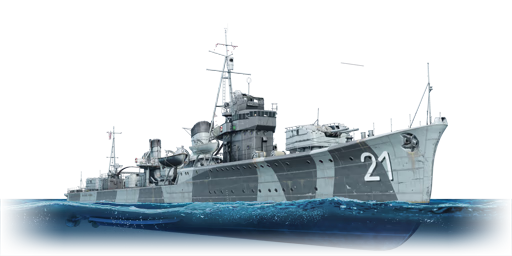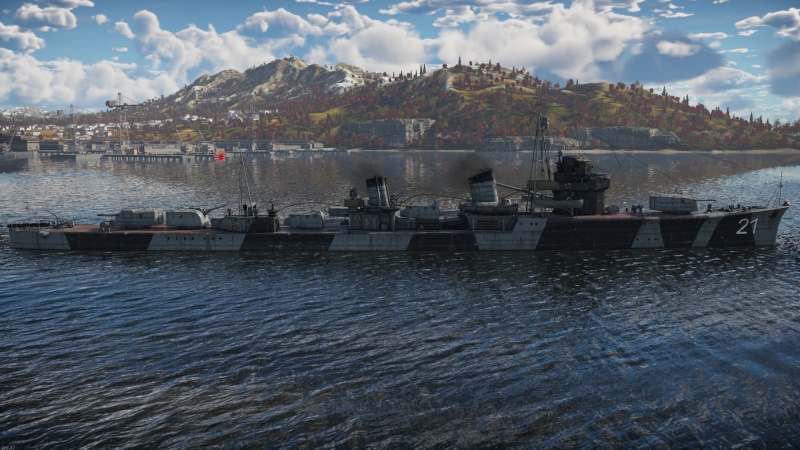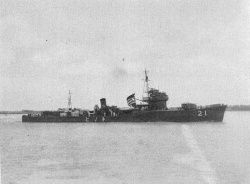IJN Nenohi
Contents
Description
The Hatsuharu-class, IJN Nenohi, 1942 (子日, namesake: New Year Day) is the second ship of her class and appears in a refit after the realization of the top-heavy design being a crucial vulnerability. Unlike Hatsuharu in her pre-commission fit, Nenohi's armament layout is more like conventional Japanese destroyers. Nenohi saw early service in the invasion of French Indochina as a radio post and took part in the Aleutian campaign in the Pacific theatre.
It was introduced in Update "Sky Guardians". Being a later refit of the Hatsuharu, her layout is more conventional to the Japanese norm and exchanges frontal firepower and total torpedo count for the better Type 93 oxygen torpedoes.
General info
Survivability and armour
Nenohi represents the post-Tomozuru and post-typhoon version of the Hatsuharu class. She's slightly longer than the Hatsuharu, displaces more tonnage (1,981 t → 2,229 t), and carries more crew than the Hatsuharu. As part of the refits, the armour thickness is reduced while armour effectiveness remains unchanged. The bridge is slightly further from the first funnel decreasing the chance of both funnel and bridge being taken out in the same salvo.
The change of armament layout also benefits the survivability of Nenohi over Hatsuharu, with the frontal single mount turret being moved to the stern of the ship, so there is only one forward barbette with ready rack ammo above the waterline, and the decrease of total torpedoes loaded onboard is less of an exploding vulnerability.
Mobility
Nenohi being slightly longer than her initial design, her total displacement increased from 1,981 t to 2,229 t, this without change in propulsion makes her slightly less manoeuvrable and slower than Hatsuharu.
| Mobility Characteristics | |||
|---|---|---|---|
| Game Mode | Upgrade Status | Maximum Speed (km/h) | |
| Forward | Reverse | ||
| AB | |||
| Upgraded | |||
| RB/SB | |||
| Upgraded | |||
Modifications and economy
Armament
Primary armament
Provide information about the characteristics of the primary armament. Evaluate their efficacy in battle based on their reload speed, ballistics and the capacity of their shells. Add a link to the main article about the weapon: {{main|Weapon name (calibre)}}. Broadly describe the ammunition available for the primary armament, and provide recommendations on how to use it and which ammunition to choose.
| Penetration statistics | |||||||
|---|---|---|---|---|---|---|---|
| Ammunition | Type of warhead |
Penetration @ 0° Angle of Attack (mm) | |||||
| 1,000 m | 2,500 m | 5,000 m | 7,500 m | 10,000 m | 15,000 m | ||
| Type 1 HE | HE | 28 | 28 | 28 | 28 | 28 | 28 |
| HE-TF | HE-TF | 26 | 26 | 26 | 26 | 26 | 26 |
| Shell details | ||||||||||||
|---|---|---|---|---|---|---|---|---|---|---|---|---|
| Ammunition | Type of warhead |
Velocity (m/s) |
Projectile mass (kg) |
Fuse delay (m) |
Fuse sensitivity (mm) |
Explosive mass (TNT equivalent) (kg) |
Ricochet | |||||
| 0% | 50% | 100% | ||||||||||
| Type 1 HE | HE | 910 | 23 | 0 | 0.1 | 2.31 | 79° | 80° | 81° | |||
| HE-TF | HE-TF | 910 | 23 | 0 | 0.1 | 2.07 | 79° | 80° | 81° | |||
Secondary armament
Some ships are fitted with weapons of various calibres. Secondary armaments are defined as weapons chosen with the control Select secondary weapon. Evaluate the secondary armaments and give advice on how to use them. Describe the ammunition available for the secondary armament. Provide recommendations on how to use them and which ammunition to choose. Remember that any anti-air armament, even heavy calibre weapons, belong in the next section. If there is no secondary armament, remove this section.
- Universal: HEF-T* · HEF · AP-T · HEI
- 25 mm APT belt: AP-T · AP-T · AP-T · HEF
- 25 mm HEIT belts: HEF-T* · HEI · HEI · HEI
| Penetration statistics | |||||||
|---|---|---|---|---|---|---|---|
| Ammunition | Penetration @ 0° Angle of Attack (mm) | ||||||
| 10 m | 100 m | 500 m | 1,000 m | 1,500 m | 2,000 m | ||
| HEF-T* | 2 | 2 | 2 | 2 | 2 | 2 | |
| HEI | 2 | 2 | 2 | 2 | 2 | 2 | |
| HEF | 2 | 2 | 2 | 2 | 2 | 2 | |
| AP-T | 55 | 53 | 43 | 33 | 25 | 19 | |
| Shell details | ||||||||||||
|---|---|---|---|---|---|---|---|---|---|---|---|---|
| Ammunition | Velocity (m/s) |
Projectile mass (kg) |
Fuse delay (m) |
Fuse sensitivity (mm) |
Explosive mass (TNT equivalent) (g) |
Ricochet | ||||||
| 0% | 50% | 100% | ||||||||||
| HEF-T* | 900 | 0.24 | 0 | 0.1 | 8.5 | 79° | 80° | 81° | ||||
| HEI | 900 | 0.26 | 0 | 0.1 | 5.52 | 79° | 80° | 81° | ||||
| HEF | 900 | 0.25 | 0 | 0.1 | 23.93 | 79° | 80° | 81° | ||||
| AP-T | 900 | 0.28 | - | - | - | 47° | 60° | 65° | ||||
Additional armament
As a 1942 ship, her 610 mm torpedo tubes are loaded with Japan's state-of-the-art Type 93 oxygen torpedoes which can cause a lot of damage and havoc in the waters she and other Japanese ships sail. Just like most Japanese ships and the torpedo doctrine of the Japanese navy, she offers two turrets with 3 tubes totalling 6 tubes, which can be reloaded once.
Additionally, Nenohi can be equipped with Type 95 depth charges, which in War Thunder can only really be used in extreme occasions when patrol boats pass through the 25 mm firing arc and sit at the stern of Nenohi, being able to defend herself by dropping the charges.
Usage in battles
Playing like any Japanese destroyer, the main selling point is the torpedo arsenal. She carries the very deadly and fast Type 93 oxygen torpedo which can beat ships 20x her size. At the lower ranks and downtiers Nenohi can face, her 12.7 cm cannons can cause plenty of damage against other destroyers and lighter vessels. Once Nenohi starts facing bigger targets, the best tactic in arcade battles is to sail away from combat range and utilize torpedoes as the primary weapon, while leaving the 12.7 cm's for close-range self-defence. In realistic battles, torpedoes should be preserved for hits that are 100% certain to hit, as reloading torpedoes on objectives is a lengthy process and not very practical.
Pros and cons
Pros:
- Possesses the Type 93 oxygen torpedo
- Decently hitting 12.7 cm cannons at her tier
Cons:
- Fairly weak anti-air defence of only 2 dual mount 25 mm's
- Lacks armour-piercing shells for the 12.7 cm
- Slow turret traverse
History
Operational history
- Early Service
Commissioned in September 1933, the second ship of the Hatsuharu-class Nenohi was quickly returned together with Hatsuharu to the dockyard after the "Tomozuru Incident" to fix the flaw in top-heavy design. After the refit, she and her class were assigned to the 1st Fleet, training up her crew as a new ship until 1940, reassigned to the 2nd Expeditionary Fleet and patrolling and escorting Japanese troops landing in French Indochina. During the initial stage of the invasion, she was docked in Hanoi and served as an ad-hoc radio station to coordinate wireless communications, later she would be rebased in Haiphong while maintaining her role there.
- Pacific Service
At the start of the Pacific war with the attack on Pearl Harbour, Nenohi was assigned as flagship of the 21st Destroyer Division under the 1st Fleet again and remained in Japanese home waters on ASW patrol. In late January 1942, she was deployed with the invasion force of the Dutch East Indies, covering landing operations at Kendari on Sulawesi, Bali and Lombok as part of "Operation H". She returned to Sasebo Naval Arsenal at the end of March for maintenance.
From May 1942, she was reassigned to northern operations and partook in "Operation AL" in support of the Aleutians campaign, patrolling around Attu, Kiska, and Amchitka Island. On the 21st of May, while refuelling from the Fuji Maru, the crew spotted a submarine at 800 m at the stern of the Nenohi, attacked it with Type 95 depth charges and reported it sunk. Upon receiving the report, the 5th Fleet ordered the confirmation, identification, and any documents on the submarine. The search party was abandoned on the 3rd of July without any trace of the submarine.
- Sinking
During the escort of the seaplane tender Kamikawa Maru in the afternoon of 5th of July, sailing at 9 knots (16 km/h) in a dense fog with less than 2 km visibility range, Nenohi was torpedoed by USS Triton southeast of Attu, near Agattu Island at 12:50. The ship was hit by a single torpedo starboard amidships, splitting her hull and sinking. The surviving crew and captain from the initial hit climbed the side of the capsized ship in 2 minutes to stay above water, chanting 「子ノ日万歳 (Neno-Hi Banzai)」 until disappearing in the cold water 5 minutes later. Even though it was summer, the Aleutian waters were very cold and with the fog being too thick, any kind of help came too late for 188 crew members including the captain. The next day the seaplane force suspended operations for the day at Kiska island and dispatched the destroyer Inazuma to find any remaining survivors, 38 who drifted their way onto land on Cape Sabak of Agattu Island survived and were rescued. On 31 July 1942, Nenohi was scrapped from the navy list.
Media
- Skins
See also
- Related development
External links
| Uraga Dock Company (浦賀船渠株式会社) | |
|---|---|
| Sub Chasers (駆潜艇) | |
| No.1 Type | Type K-3 No.1 |
| Destroyers (DD) | |
| Hatsuharu-class | IJN Nenohi |
| Yugumo-class | IJN Kiyoshimo |
| Light Cruisers (CL) | |
| Nagara-class | IJN Isuzu |
| Japan destroyers | |
|---|---|
| IJN | |
| Momi-class | IJN Momi |
| Mutsuki-class | IJN Mutsuki · IJN Satsuki |
| Fubuki-class | IJN Ayanami |
| Hatsuharu-class | IJN Hatsuharu · IJN Nenohi |
| Shiratsuyu-class | IJN Yuudachi |
| Yugumo-class | IJN Yugumo · IJN Hayanami · IJN Kiyoshimo |
| Shimakaze-class | IJN Shimakaze |
| Akizuki-class | IJN Akizuki · IJN Hatsuzuki |
| JMSDF | |
| Ariake-class* | JDS Yūgure (DD-184) |
| Harukaze-class | JDS Harukaze (DD-101) |
| Murasame-class | JDS Murasame (DD-107) |
| * Modified Fletcher-class destroyers | |
| Japan premium ships | |
|---|---|
| Motor torpedo boats | Type T-14 (mod. 1) · Type T-51a |
| Motor gun boats | Type 4 (Mod 4) · PG 02 |
| Sub-chasers | Type K-8 No.13 |
| Frigates | Akebono |
| Destroyers | IJN Satsuki · IJN Nenohi · IJN Hayanami · IJN Kiyoshimo · IJN Yuudachi · JDS Yūgure (DD-184) |
| Light cruisers | IJN Yubari · IJN Mikuma |
| Heavy cruisers | IJN Myoko |
| Battleships | IJN Yamashiro |






